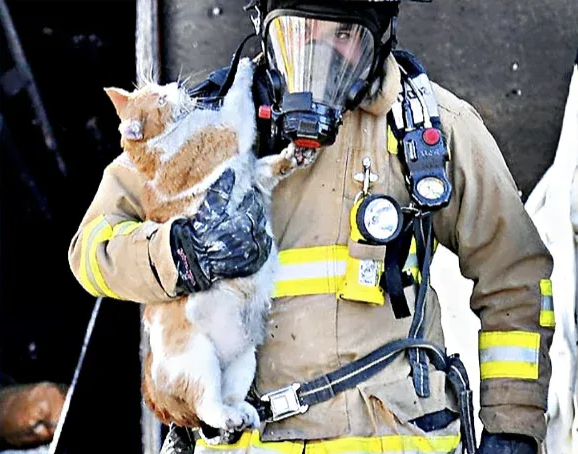
Flames swallowed the block. Firefighter Daniel heard something beneath the collapsing wood—a faint meow, barely audible over the roar of fire consuming everything around it. Most people wouldn’t have heard it. Most who did would have kept moving, focused on bigger priorities, human lives, structural integrity.
But Daniel heard it. And he pushed through the smoke.
He found her trembling under a cabinet, a small cat paralyzed by fear and smoke inhalation. He pulled her free, tucked her against his chest, and made his way back through the inferno. Outside, he dropped to his knees, shielding her with his jacket while cameras flashed and colleagues rushed to help. He whispered through his mask: “You’re safe now.”
A reporter asked the question everyone was thinking: Why risk his life for a cat?
Daniel’s answer was simple and profound: “Because it was alive. That’s enough.”
The cat, named Ember, recovered. She lives at the station now, sleeping in Daniel’s locker. Every shift, she waits by the door until he returns, greeting him like he’s the most important person in the world. Because to her, he is. He’s the human who ran into fire to save her when she had no way to save herself.
The photo captures the moment—Daniel in full firefighting gear, helmet and mask, breathing apparatus visible, holding a small orange and white cat against his chest. The cat looks dazed, singed, but alive. Daniel’s gloved hand supports her gently despite the chaos around them.
“Heroism isn’t always grand,” the caption reminds us. “Sometimes it’s just choosing life over easier paths.”
Daniel could have kept moving. Could have focused on containing the fire, protecting property, ensuring human safety. All valid priorities. No one would have blamed him for not stopping for a cat.
But he heard that meow. And he made a choice that revealed something about his character: that life matters, regardless of its form. That when you have the power to save something, you do it. That convenience doesn’t outweigh compassion.
“Because it was alive. That’s enough.”
It’s one of the most beautiful statements about the value of life you’ll ever hear. Not “because it was someone’s pet” or “because cats are valuable” or “because people would be upset if I didn’t.” Just: because it was alive.
That answer suggests Daniel would have done the same for any living creature. A dog, a bird, a rabbit. Life itself was enough justification for the risk.
Now Ember lives at the station. She’s become part of the crew, the unofficial mascot who sleeps in a firefighter’s locker and waits by the door every shift change. The firefighters joke that she’s on duty, that she’s their good luck charm, that she’s keeping them safe the way Daniel kept her safe.
But really, Ember represents something deeper. She’s a daily reminder that heroism sometimes looks like stopping for the small things. That the choice to save one life—even when that life is “just” a cat—matters.
Every shift, Ember waits by the door until Daniel returns. She remembers. Animals don’t forget when someone saves them. They don’t understand the details of risk assessment or duty protocols. They just know: this human ran into danger for me. This human made me safe.
That bond—between the firefighter and the cat he saved—is one of the most pure forms of connection. It’s not complicated by language or expectations or misunderstanding. It’s simple: he saved her, she loves him, they belong to each other now.
The photo could be just another rescue shot. Firefighters save animals all the time. But Daniel’s answer to why he did it elevates this moment into something more significant. “Because it was alive. That’s enough.”
In a world that constantly asks us to justify compassion, to prove that care is warranted, to demonstrate that effort will be rewarded, Daniel’s philosophy is radically simple: life itself is enough justification.
The cat was alive. He could help. So he did.
Heroism isn’t always grand. Sometimes it’s just choosing life over easier paths. It’s hearing a meow in a burning building and deciding that sound matters. It’s pushing through smoke when you could keep moving. It’s tucking a frightened animal against your chest and whispering “you’re safe now” even though no one asked you to care.
Ember recovered. Lives at the station. Waits by the door every shift. And every time Daniel walks in and she greets him, he’s reminded of why he does this job.
Because life is alive. And that’s enough.